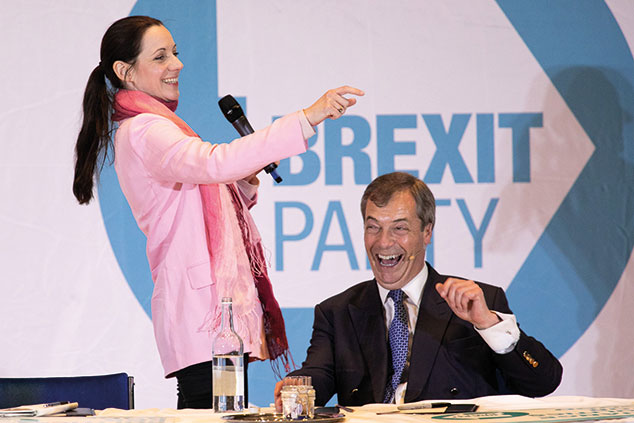
The failure to deliver Brexit is “doing serious damage” to the Conservatives’ electoral prospects and, assuming they take place, the European elections could provide the perfect opportunity for Tory Leavers to “express their disappointment”, says John Curtice in The Daily Telegraph.
Protest voting, a greater willingness to vote for smaller parties, and taking the opportunity to “express disquiet about the EU” have long been features of Euro-elections; these factors are all set to “work against” the Conservatives on 23 May.
A surge of Faragistas
New projections suggest that Labour would “emerge as the biggest UK force in the European Parliament”, returning 19 MEPs to Brussels if Theresa May cannot stop EU elections taking place by getting her Brexit deal through parliament by 22 May, says Mehreen Khan in the Financial Times.
They also show a “surge in support” for Nigel Farage’s recently launched Brexit Party, which would gain ten MEPs (candidates include Annunziata Rees-Mogg, the sister of Conservative MP Jacob Rees-Mogg, and ex-Communist Claire Fox). The Conservative Party is projected to win 12 seats, Ukip nine, the Liberal Democrats six and the newly formed anti-Brexit Change UK four. A recent internal poll from the European Parliament gave Labour an even bigger lead, with 28 seats.
Theresa May’s best chance of stopping all this is to reach an agreement with Labour, says Adam Boulton in The Sunday Times. “Inconveniently,” however, party rivalries are “already inflamed” by campaigns for local elections on 2 May. And if May were to “conclude her courtship with Jeremy Corbyn and the Labour Party and sign up to a permanent customs union and alignment with single-market rules… support for her party could collapse”, says Nigel Farage in The Daily Telegraph.
Farage is “pretty sure” that No.10 will choose to “take the hit that is coming its way” on 23 May rather than “destroy the party”, although it may already “be too late” for that. Citizens no longer “just want to leave the EU, they want to change politics altogether”.
Farage’s Brexit Party, “freed of some of the Ukip ‘fruitcakes’”, could be a “potent political threat” to the Tories and Labour, says Richard Littlejohn in the Daily Mail. There is a still a chance that the Tories could “jettison May immediately” and choose a leader committed to Brexit to avoid participation in these “ludicrous” EU elections, but “I’m not holding my breath”. With the Faragistas “surging ahead” (his party already has more than 100,000 registered supporters, notes Matthew Goodwin in The Daily Telegraph), they could “annihilate both main parties”.
Beyond Brexit
If Farage’s party wins the European elections “there will be consequences far beyond Brexit”, says Andrew Adonis, who is standing to be a Labour MEP, in The Guardian. His victory will “embolden the hard right of the Conservative Party”, who will take it as a “mandate for a hard, no-deal Brexit”. As part of their Thatcherite revolution, they will then “set about dismantling our public services and our public realm”. It is “imperative” that Labour comes out on top.
Farage has already said that he plans to target the millions of Labour voters who voted for Brexit, says Sam Coates in The Times. Indeed, he plans to use a quote from Adonis, who told an LBC phone-in last September, “If you’re a Brexiteer, I hope you won’t vote for the Labour Party”. Adonis told The Times that he made the remark before the party adopted the referendum policy, and urged both Leavers and Remainers to vote for Labour.